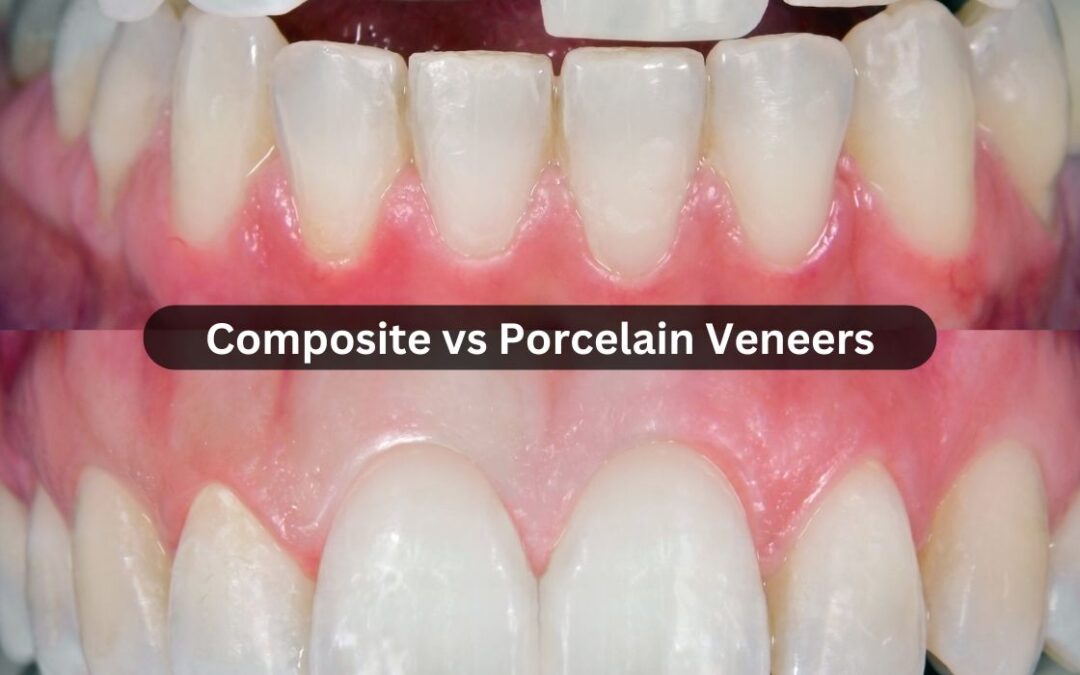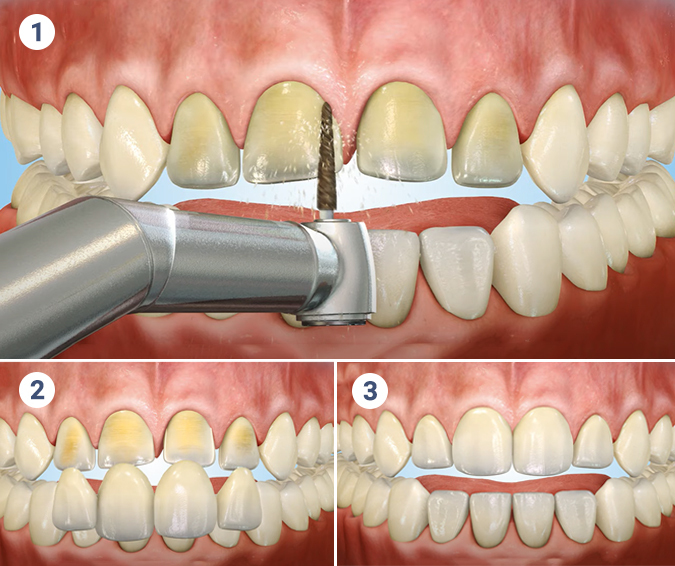Veneers Teeth Explained: Procedures, Care, and Longevity Tips
Opening the Tricks of Veneers: Facts, Kinds, and Benefits for a Gorgeous Smile
Veneers offer a compelling solution for those seeking to improve their smiles. These oral improvements can resolve numerous imperfections, from discoloration to imbalance. With options like porcelain and composite, people can select based upon their requirements and preferences. Understanding the subtleties of veneers, including application and care, is crucial. What aspects should one take into consideration prior to making a decision? The solutions may shock those curious about this visual oral option.

Recognizing Veneers: What Are They?
Veneers are thin, customized coverings created to cover the front surface of teeth, boosting their appearance. Commonly crafted from resilient materials, these shells are tailored to fit each individual's teeth specifically. They serve multiple functions, consisting of remedying visual imperfections such as discoloration, chips, or spaces. The application process involves a dental expert preparing the teeth, typically by removing a percentage of enamel to assure a snug fit. When prepared, the veneers are adhered to the teeth utilizing a solid adhesive.
Clients often select veneers for their ability to produce a natural-looking smile while supplying a resilient solution to dental imperfections. Unlike other aesthetic dentistry options, veneers need minimal invasive procedures, making them a preferred selection. The result is a better smile that can significantly increase an individual's confidence and self-esteem. In general, veneers supply an efficient strategy to attaining a more appealing and unified oral look.
Sorts of Veneers: Porcelain vs. Composite
When thinking about aesthetic dental choices, two key sorts of veneers stand out: porcelain and composite. Porcelain veneers are crafted from a long lasting ceramic material that imitates the natural appearance of teeth. They are understood for their tarnish resistance and ability to show light similarly to all-natural enamel, supplying a visual allure that many individuals desire. The application process typically includes even more prep work of the tooth structure and may need numerous check outs to the dentist.
On the various other hand, composite veneers are made from a tooth-colored resin that is straight related to the teeth. This type enables quicker application and can often be finished in a single go to. While they are less costly than porcelain veneers, they might not supply the very same durability or resistance to staining. Eventually, the option between porcelain and composite veneers depends upon specific choices, spending plan, and specific oral needs.
The Advantages of Picking Veneers
Choosing veneers uses countless advantages that can considerably improve both the aesthetics and capability of an individual's smile. One of the primary advantages is their capacity to fix flaws such as discoloration, voids, and imbalance, resulting in a much more uniform appearance. Veneers can likewise enhance the durability of teeth, providing a protective layer that shields them from damage.
They need very little tooth prep work compared to various other dental procedures, maintaining even more of the all-natural tooth framework. This conservation adds to a healthier oral atmosphere while still accomplishing a sensational smile.
Veneers are highly customizable, allowing people to select the form, dimension, and color that finest fits their preferences. Furthermore, they are stain-resistant, making it much easier to keep a eye-catching and bright smile gradually. On the whole, veneers provide an effective option for those looking for both cosmetic improvement and long-lasting oral health and wellness benefits.
The Veneer Application Refine
The veneer application procedure involves numerous vital steps to ensure excellent results. An examination is conducted to assess the person's requirements, adhered to by the preparation and shaping of the teeth. Lastly, the veneers are bonded in place, with adjustments produced an ideal fit and look.
First Examination Steps
An extensive preliminary consultation is essential for any individual thinking about veneers, as it sets the structure for a successful treatment. During this conference, the dental professional examines the person's oral health and wellness, talking about any existing concerns that can affect the veneer application. This analysis may include X-rays and an aesthetic exam to establish the problem of the gums and teeth.
The dental professional additionally engages the person in an in-depth discussion concerning their aesthetic objectives, choices, and expectations. They may offer various veneer alternatives tailored to the patient's certain requirements. In addition, the specialist discusses the procedure, possible risks, and aftercare demands, making certain that the person is comfy and knowledgeable before proceeding with the treatment.
Preparation and Forming Teeth
After the initial examination, the next phase includes the preparation and shaping of the teeth to suit the veneers. This crucial action is performed by the dental professional, that carefully examines the tooth structure to identify the quantity of enamel that needs to be eliminated. Generally, a slim layer, usually around 0.5 millimeters, is slashed off to ensure a correct fit for the veneers. Precision is paramount during this procedure, as it influences both the visual end result and the general convenience. As soon as the teeth are effectively formed, perceptions are taken to create customized veneers that straighten completely with the client's dental account. This precise preparation sets the stage for why not look here an effective veneer application, improving both look and feature.
Bonding and Final Adjustments
Complying with the shaping and prep work of the teeth, the bonding process begins, noting an essential stage in the veneer application. During this phase, a dental adhesive is related to the ready tooth surface area, ensuring a solid bond in between the tooth and the veneer. The dental expert meticulously positions the veneer, making changes to attain the wanted placement and looks. As soon as properly placed, a special light is utilized to treat the adhesive, strengthening the bond. After treating, the dental expert conducts last changes, cutting any excess material and refining the veneer's shape to guarantee a natural look. This cautious focus to detail boosts both function and looks, adding to a total gorgeous smile that is resilient and resilient.
Taking care of Your Veneers: Maintenance Tips
Taking care of veneers is essential to maintain their appearance and durability. A consistent everyday cleansing routine, mindful evasion of discoloring foods, and regular dental exams are essential parts of efficient maintenance. These practices assist guarantee that veneers stay in peak condition and remain to improve one's smile.
Daily Cleansing Regimen
Routinely maintaining veneers is vital for their long life and look. A proper daily cleansing routine can help protect their sparkle and stop damage. Dental practitioners recommend cleaning two times a day with a soft-bristled toothbrush and fluoride tooth paste, guaranteeing that all surfaces are cleansed delicately to avoid damaging the veneer surface area. Flossing daily is also essential to get rid of food fragments and plaque from in between teeth, where brushes may not reach. Additionally, using an antimicrobial mouth wash can assist preserve dental health without hurting the veneers. It is suggested to avoid rough cleaners and tools that can scrape the veneer. By complying with these basic actions, individuals can keep their veneers looking lovely while advertising overall dental wellness.
Staying Clear Of Discoloration Foods
Although veneers are made to boost the appearance of teeth, their vulnerability to tarnishing necessitates careful nutritional options. It is essential for individuals with veneers to be mindful of certain foods and drinks that can lead to discoloration. Dark-colored products such as coffee, merlot, and berry juices ought to be consumed in moderation, as they are More Info known to stain both all-natural teeth and veneers. Additionally, acidic foods like citrus fruits container deteriorate the bonding representatives used in veneers, making them extra prone to discoloration. To keep a bright smile, it is suggested to wash the mouth with water after taking in discoloration foods and to exercise routine oral hygiene. These thoughtful selections add considerably to the durability and aesthetic appeals of veneers.

Routine Oral Examinations

Preserving the stability of veneers needs a dedication to regular dental check-ups, as these visits play a crucial duty in ensuring their durability and look. Throughout these brows through, dental experts can assess the condition of the veneers, checking for any signs of wear, damages, or underlying oral concerns. In addition, regular cleansings help eliminate plaque and tartar that can collect around the veneers, advertising overall oral wellness. Dental experts can also offer individualized guidance on care techniques and products fit for veneer upkeep. By adhering to a routine of exams, individuals can address potential issues early, guaranteeing their smile stays lovely and vivid. Eventually, normal oral brows through are an essential element of veneer care.
Is Veneers the Right Choice for You?
Choosing whether veneers are the right choice usually rests on private visual objectives and dental demands. For those seeking to resolve concerns go to this web-site such as discoloration, chips, or misalignment, veneers can supply a transformative remedy. Prospects usually include people with healthy teeth yet prefer an enhanced smile.
It is crucial to take right into account elements such as tooth enamel problem, the extent of dental concerns, and the determination to maintain veneers. Consulting with a dental expert is important, as they can review dental wellness and determine if veneers are ideal
Furthermore, prospective prospects need to assess the long-lasting commitment, as veneers might require substitute every 10-15 years. Expense factors to consider additionally play a significant function, as veneers can be a considerable investment. Ultimately, the decision must be well-informed, stabilizing visual wishes with functional considerations for lasting results.
Often Asked Concerns
How Much Time Do Veneers Generally Last Prior To Needing Substitute?
Veneers typically last between 10 to 15 years prior to needing substitute. Elements such as oral health, way of living selections, and material high quality can influence their durability, making routine oral examinations crucial for preserving their problem.
Are Veneers Safe for Individuals With Delicate Teeth?
Veneers can be risk-free for people with delicate teeth, but it often relies on the seriousness of level of sensitivity and the dental expert's strategy. Consulting an oral expert before continuing is necessary to ensure optimal outcomes.
Can Veneers Be Removed or Replaced Conveniently?

Do Veneers Stain Gradually, and Just How Can I Stop It?
Veneers can tarnish gradually, specifically from foods and drinks like coffee or merlot. To avoid discoloration, maintaining good oral health, utilizing a straw for beverages, and regular dental cleanings are advised methods.
What Is the Price Array for Getting Veneers?
The cost of veneers normally varies from $500 to $2,500 per tooth, relying on aspects such as material type, dental expert experience, and area. Individuals must speak with oral specialists for personalized quotes and financing options.
Once the teeth are sufficiently formed, perceptions are taken to produce customized veneers that line up perfectly with the person's dental account. During this stage, an oral adhesive is used to the prepared tooth surface area, guaranteeing a solid bond in between the veneer and the tooth. It is crucial to take right into account factors such as tooth enamel condition, the level of dental concerns, and the readiness to maintain veneers. Veneers can be secure for individuals with delicate teeth, however it usually depends on the seriousness of sensitivity and the dental practitioner's strategy. The expense of veneers commonly ranges from $500 to $2,500 per tooth, depending on factors such as material kind, dentist experience, and area.